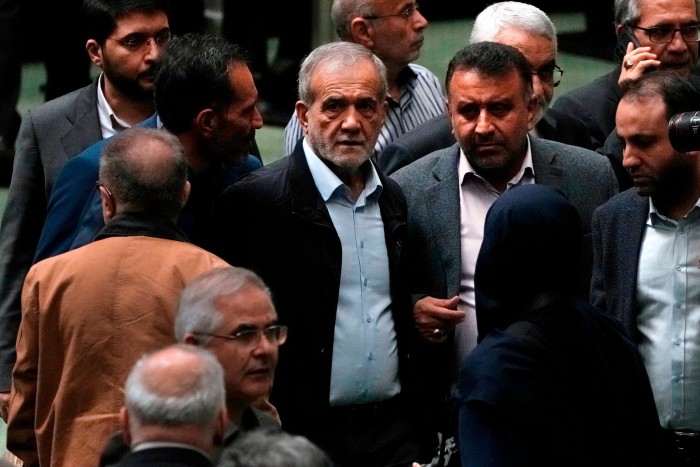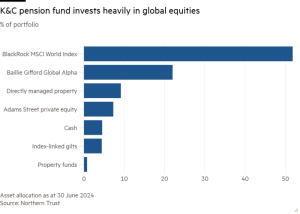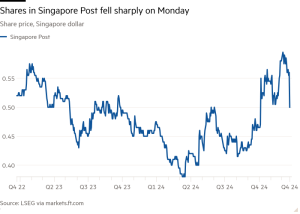Iran’s president urged to scrap stricter hijab law

Unlock the Editor’s Digest for free
Roula Khalaf, Editor of the FT, selects her favourite stories in this weekly newsletter.
Iran’s President Masoud Pezeshkian is under mounting pressure from his supporters to halt a new law that will toughen measures against women who defy orders to wear the hijab.
The push to enforce the law is an attempt by the hardline parliament to challenge the reform-orientated administration of Pezeshkian, and a test of the Islamic republic’s ability to maintain a tight grip on social and cultural policies.
But former and current officials, activists and experts have been calling for the law, which was passed by MPs and the powerful Guardian Council in September, to be scrapped. The legislation will be formally sent to Pezeshkian on December 13, who will have five days to sign it, the last formal step for its enactment.
“The law is literally impossible to implement. It totally lacks rationality,” said Saeed Laylaz, a political analyst. “It is a lose-lose game for the Islamic republic”.
Mohsen Gharavian, a conservative cleric, said the law should be repealed because it lacked public approval. “When a law is impractical, the government needs to object and return it for review.”
The 70-article Hijab and Chastity Law outlines cash penalties of $200-$2,000 for women uncovering their hair or exposing their forearms, lower legs or chest. Repeat offenders could face jail terms.
Failure to pay fines could deprive women of the right to obtain a passport, or driver’s licence. They could also face social media and banking restrictions. Celebrities promoting non-observance of the hijab law would face heavier fines, starting from $13,000.
Masoumeh Ebtekar, a former vice-president for women and family affairs, said it was “the public demand that the president put a halt to the legislation,” warning that its implementation would “widen gaps and create distrust in society”.

Pezeshkian has suggested his administration is not prepared to apply the new law. “There are ambiguities about this law, which is not easy to enforce,” he said this week. “We should not act in a way that would undermine national solidarity.”
The approach could put his government on a collision course with the conservative parliament speaker and judiciary chief, both of whom have doubled down on the need to enforce the law.
Laylaz said the law was “a scare tactic used to implement social control by manipulating women’s aggressive behaviour”.
Should Pezeshkian refuse to sign the legislation, the parliament speaker will still announce the law, deepening the uncertainty about the new rules.
Mohammad Bathaei, deputy interior minister, said this week. “If the executive capacity to enforce a law [is] absent, it will be unenforceable like many other legislations, which were passed but eventually shelved.”
The hijab became obligatory after the 1979 Islamic revolution, with potential punishments made tougher four years later. In 2005, morality police patrols were created to enforce the dress code.
In 2022, deadly protests swept the country after the death in custody of Mahsa Amini, a young woman detained for “improper” clothing. Hijab patrols were initially withdrawn after the unrest but returned the following year. A female university student who allegedly removed her clothing in a protest over compulsory hijab laws was detained for several days last month.
In his presidential campaign, Pezeshkian promised voters he would end hijab crackdowns.
The legislation mandates the use of artificial intelligence and surveillance cameras operated by the intelligence and defence ministries to identify violators.
It also obliges businesses and residences to share CCTV footage with police, while drivers of ride-hailing services will be required to report passengers violating the laws.
“They want to penalise a cab driver for a non-compliant passenger or a restaurant owner for serving non-compliant customers,” Pezeshkian said, adding the approach would lead to public “disillusionment”.
Mohammad Fazeli, a sociologist, warned Iran would “erode from within” if it enforced the hijab law at a time when it faces the threat of a war in the Middle East and other issues such as economic stagnation, financial sanctions, power blackouts and environmental problems.
#Irans #president #urged #scrap #stricter #hijab #law






